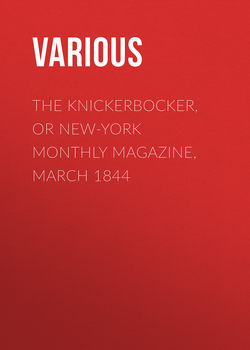Читать книгу The Knickerbocker, or New-York Monthly Magazine, March 1844 - Various - Страница 9
THE FRATRICIDE’S DEATH
ОглавлениеA RHAPSODY
The following effort of a wild and maddened imagination, rioting in its own unreal world, is by the ‘American Opium-Eater,’ whose remarkable history was given in the Knickerbocker for July, 1842. The MS. is stained in several places with the powerful drug, to the abuse of which the writer was so irresistibly addicted. The subjoined remarks precede the poem: ‘This extravaganza is worthy of preservation only as ‘a psychological curiosity,’ like Coleridge’s ‘Kubla Khan,’ which was composed under similar circumstances; if that indeed can be called composition, in which all the images rose up before the writer as THINGS, with a parallel production of the correspondent expressions, without any sensation or consciousness of effort. On awaking, he appeared to have a distinct recollection of the whole: taking his pen, ink and paper, he instantly and eagerly wrote down the lines that are here preserved. The state of corporeal sleep but intellectual activity, during the continuance of which the phenomenon above described occurred, was caused by a very large dose of opium, and came upon me while reading the ‘Confession of a Fratricide,’ published by the priest who attended him in his last moments. I should warn the reader that the fratricide, like the author, could not be said to possess the ‘mens sana in corpore sano,’ both having been deranged.’
Ed. Knickerbocker.
The universe shook as the monarch passed
On the way to his northern throne;
His robe of snow around him he cast,
He rode on the wings of the roaring blast,
And beneath him dark clouds were blown.
His furrow’d and hoary brow was wreathed
With a crown of diamond frost;
Even space was chill’d wherever he breathed,
And the last faint smiles which summer bequeathed,
Ere she left the world, were lost.
The leaves which wan Autumn’s breath had seared
Stern Winter swept away;
Dark and dreary all earth appeared—
The very beams of the bright sun feared
To pursue their accustom’d way.
Mirth’s merry laugh at that moment fled,
And Pleasure’s fair cheek grew pale:
The living sat like the stony dead,
The rough torrent froze in its craggy bed,
And Heaven’s dew turned to hail.
The forest trees waved their heads on high,
And shrunk from the storm’s fierce stroke;
The lightning flash’d as from God’s own eye,
The thunderbolt crash’d through the startled sky,
As it split the defying oak.
The proud lion trembled and hush’d his roar,
The tigress crouch’d in fear;
The angry sea beat the shuddering shore,
And the deafening voice of the elements’ war
Burst terribly on the ear.
I stood by the bed where the prisoner lay;
The lamp gave a fitful light:
His soul was struggling to pass away;
Oh, God! how I pray’d for the coming of day!
Death was awful in such a night.
His cheek was hollow, and sunk, and wan,
And his lips were thin and blue;
The unearthly look of that dying man,
As his tale of horror he thus began,
Sent a chill my warm heart through:
‘The plague-spots of crime have sunk deep in my heart,
And withered my whirling brain;
The deep stamp of murder could never depart
From this brow, where the Angel of Death’s fiery dart
Had graven the curse of Cain.
‘Remorse has oft waved his dusky wings
O’er the path I was doom’d to tread;
Despair has long frozen Hope’s warm springs;
I have felt the soul’s madness which Memory brings,
When she wakes up the murder’d dead.
‘Tell me not now of God’s mercy or love!
